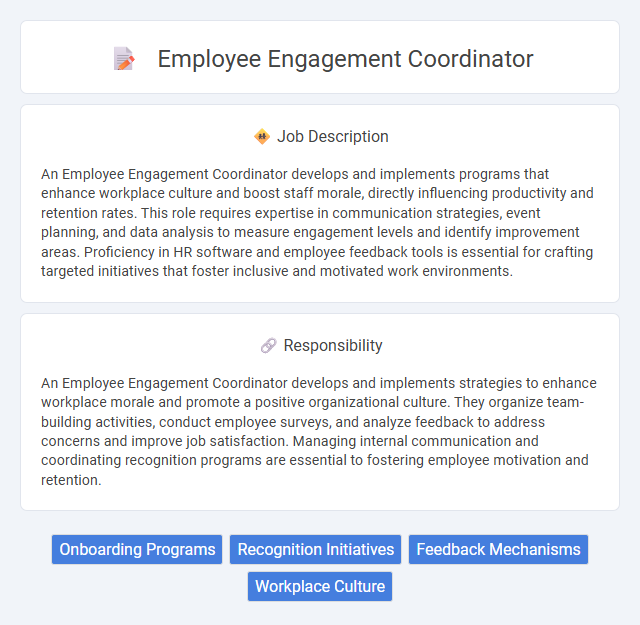
An Employee Engagement Coordinator develops and implements programs that enhance workplace culture and boost staff morale, directly influencing productivity and retention rates. This role requires expertise in communication strategies, event planning, and data analysis to measure engagement levels and identify improvement areas. Proficiency in HR software and employee feedback tools is essential for crafting targeted initiatives that foster inclusive and motivated work environments.
Individuals who are naturally empathetic, communicative, and motivated by fostering positive workplace environments are likely to thrive as Employee Engagement Coordinators. Those who show strong interpersonal skills and have a genuine interest in employee well-being may find this role particularly suitable. People who prefer routine tasks over dynamic interactions might find this position less compatible with their strengths.
Qualification
An Employee Engagement Coordinator typically requires a bachelor's degree in Human Resources, Business Administration, or a related field, combined with strong communication and organizational skills. Proven experience in employee relations, event planning, and data analysis enhances the ability to design and implement engagement programs effectively. Certification in HR or employee engagement frameworks, such as SHRM-CP or Gallup, is highly valued for demonstrating expertise and commitment.
Responsibility
An Employee Engagement Coordinator develops and implements strategies to enhance workplace morale and promote a positive organizational culture. They organize team-building activities, conduct employee surveys, and analyze feedback to address concerns and improve job satisfaction. Managing internal communication and coordinating recognition programs are essential to fostering employee motivation and retention.
Benefit
An Employee Engagement Coordinator is likely to enhance workplace morale by implementing programs that foster communication and collaboration. Increased employee satisfaction may lead to higher retention rates and reduced turnover costs. The role probably contributes to a more motivated and productive workforce, benefiting overall organizational performance.
Challenge
Employee engagement coordinators likely face the challenge of balancing diverse employee needs while fostering a cohesive and motivated workplace culture. Managing the dynamic expectations of both staff and management may require innovative communication strategies and adaptability. Success in this role probably depends on effectively addressing engagement barriers to enhance overall productivity and satisfaction.
Career Advancement
An Employee Engagement Coordinator plays a crucial role in enhancing workplace culture by designing and implementing strategies that boost employee motivation and satisfaction. Mastery in communication, project management, and data analysis opens pathways to higher-level HR positions such as Employee Experience Manager or Organizational Development Specialist. Developing expertise in employee engagement metrics and leadership training significantly accelerates career growth within human resources and talent management fields.
Key Terms
Onboarding Programs
Employee engagement coordinators design and implement onboarding programs to enhance new hire integration and retention, ensuring a smooth transition into company culture. They collaborate with HR and department leaders to create personalized onboarding experiences that boost employee motivation and productivity from day one. Metrics such as reduced turnover rates and improved employee satisfaction scores demonstrate the effectiveness of these programs.
Recognition Initiatives
An Employee Engagement Coordinator designs and implements recognition initiatives that boost morale and reinforce a positive workplace culture. By developing programs such as peer-to-peer awards, employee of the month, and milestone celebrations, they increase motivation and reduce turnover rates. Effective recognition strategies lead to higher productivity, fostering a sense of belonging and commitment among employees.
Feedback Mechanisms
An Employee Engagement Coordinator develops and implements robust feedback mechanisms to capture employee sentiment and drive continuous organizational improvement. Utilizing tools such as surveys, focus groups, and real-time feedback platforms enhances communication and fosters a culture of openness. Effective feedback systems contribute to higher employee satisfaction, reduced turnover, and increased productivity.
Workplace Culture
An Employee Engagement Coordinator drives initiatives that cultivate a positive workplace culture by promoting open communication, recognition programs, and team-building activities. They analyze employee feedback and collaboration patterns to enhance job satisfaction and reduce turnover rates. Their role supports organizational goals by fostering an inclusive environment that encourages productivity and employee well-being.
 kuljobs.com
kuljobs.com